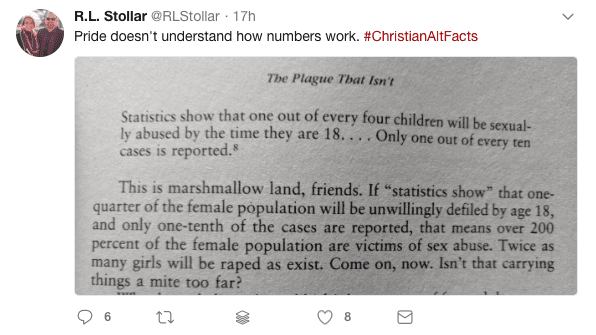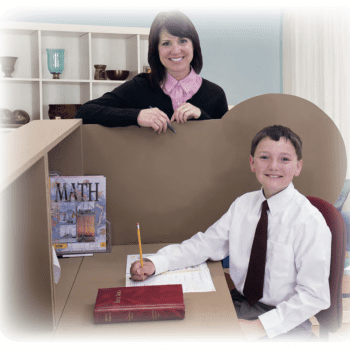It’s been a while since I’ve written about homeschooling and child abuse—or rather, about homeschool advocacy organizations like the Home School Legal Defense Association who oppose oversight for homeschooling and excuse cases where abusive parents use homeschooling to isolate their children and hide abuse as aberrations. But Ryan Stollar’s twitter review of Mary Pride’s The Child Abuse Industry offers a moment for pause and reflection.
Mary Pride, author of The Way Home: Beyond Feminism, Back to Reality, was so influential in Christian homeschool circles during the 1980s that she was sometimes known as “the queen of homeschooling.” But in addition to encouraging women to be housewives and promoting homeschooling—she homeschooled her nine children, published a popular homeschool magazine, and wrote numerous books on the subject—Pride also wrote a book titled The Child Abuse Industry: Outrageous Facts About Child Abuse & Everyday Rebellions Against a System that Threatens Every North American Family (published in 1985).
In her book, Pride argues that child abuse is a made-up epidemic, that child abuse hotlines are the equivalent to the KGB in the USSR. She argues that sexual abuse is overblown and in fact that sexual abuse prevention programs encourage and facilitate incest.
Have a look at some of the tweets from Stollar’s review:

“Mary Pride begins with making sweeping statements like ‘the major problem is that the public has been convinced that child abuse is a major problem,'” Stollar writes. In other words, the problem is not child abuse—the problem is that people think child abuse is a major problem.

“Pride doesn’t understand how numbers work,” Stollar writes. He includes an image from Pride’s book in which she includes quotes that state that “statistics show that one out of every four children will be sexually abused by the time they are 18” and “only one out of every ten cases is reported” in order to argue that, according to this logic, “over 200 percent of the female population are victims of sex abuse.” This, she writes, is “marshmallow land.”
To come up with this claim, Pride multiplies the 25% of children who are sexually abused by 10, because only one in ten cases is reported, and comes up with 250%. “Twice as many girls will be raped as exist,” she writes. The problem, of course, is that that 25% figure takes into account the fact that only one in ten cases are reported—it is not the number of cases reported. Statistics like the 25% number are not based on reports to police—they’re typically based on surveys conducted later.
“Isn’t it possible to organize a bridge party without staring at an abused woman across the table?” Pride asks, throwing shade on the 25% number. Child abuse prevention programs produce “an entire generation of males who have been trained to consider raping their sons and daughters as passably normal behavior,” she adds, arguing that discouraging behavior puts it into people’s minds, and that concerns that sexual abuse is too common suggests to fathers and brothers that it is “normal behavior” and therefore acceptable.
“We need to stop allowing the unsupported testimony of children who are of an age where they can barely distinguish fantasy from reality,” Pride writes. “Abolish the child abuse hotlines,” she continues. “Abolish no-fault divorce.” Pride advisers her readers to never call a child abuse hotline. “As for reporting your ‘suspicions’ if you are a mandatory reporter: any law that meddles with your thoughts is innately wrong,” she writes (emphasis in original). “Ignore it.”
“We need to get rid of coercive social worker and replace it with justice and voluntary help” (emphasis in original), Pride concludes. She calls child protective services caseworkers “a plague of leeches” and refers to what she calls an overblown “child abuse hysteria.”
Pride’s words matter, for at least two reasons.
First, I grew up in a homeschool community where abuse and educational neglect occurred and went unreported. I am aware of cases where individuals knew that there was abuse in homes but did not report—or where they discounted suspicions of very real abuse or neglect because parents have the right to decide how to raise their children, or because the secular authorities cannot be trusted. Mary Pride’s book contributed to the creation of community norms predisposed to overlook or dismiss abuse.
Second, last April a report in Connecticut revealed that 36% of children removed from school to be homeschooled between 2013 and 2016 lived in a family that had previously been reported for child abuse or neglect. Pride’s book, and the ideas it promotes, prime homeschoolers to disbelieve the significance of such a revelation. Rather than participating in creating laws to ensure that abusive parents do not take advantage of a state’s laws to isolate their children, many homeschooling parents deny, deny, deny.
Pride’s claims and the community norms she helped create, in other words, have real-world consequences.
I have a Patreon! Please support my writing!















